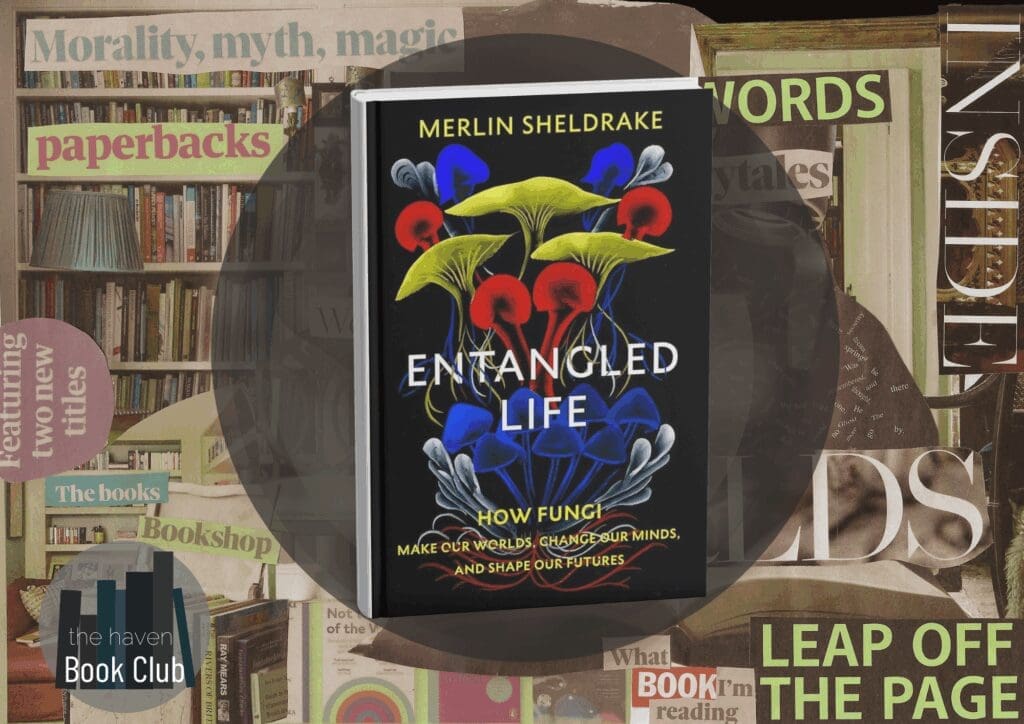Book Club | Entangled Life (Merlin Sheldrake)

Our July 2025 book club took us into the tangled, sticky, spongy world of fungi, which is something most of us hadn’t given much thought to before. Merlin Sheldrake’s Entangled Life opened a portal into a different realm, and we were struck by ideas like intelligence not requiring a brain and survival being more than an individual endeavour.
It was a refreshing read on our non-fiction list. It presents a fascinating blend of science, philosophy, and imagination, delivered with poetic flair and a quiet reverence for the overlooked. While there isn’t an explicit connection to life for highly sensitive people, we found more than a few parallel threads worth exploring.
Slime molds, shrooms, lichen – and a few other entanglements. Inspired by The Haven Book Club, July 2025: Entangled Life by Merlin Sheldrake Photos: Tuula Ahde Music: “Fungi” by Andy Mort
There is So Much We Don’t Yet Know
One of the big takeaways? We barely know fungi at all.
“The best estimate suggests that there are between 2.2 and 3.8 million species of fungi in the world – six to ten times the estimated number of plant species – meaning that a mere 6 per cent of all fungal species have been described. We are only just beginning to understand the intricacies and sophistications of fungal lives.”
Despite being essential to life on Earth, they’ve long been ignored or even dismissed as “gross.” But as Sheldrake gently reminds us, fungi are foundational collaborators in ecosystems. His enthusiasm was contagious. Even those of us not well-versed in the world of biology found ourselves drawn in by his presentation and storytelling approach.
And yes, as well as magical and mysterious, there is still a lot to be bewildered and even terrified by. Parasytical cordyceps, I’m looking in your direction! I definitely want to consider the cultural echoes of a nervous system hijacking organism that causes ants to climb as high as possible before the fungus ruptures through the insect, sprouting from its body and spreading its spores. There is something about seeing the bewitched ant appearing to act of its own volition, but dutifully climbing to its own demise. There’s a rich metaphor in there somewhere.
Symbiosis & Interconnectedness
The idea of mutually assured survival (instead of destruction) really resonated. Fungi and plants cooperate and collaborate, not just coexist. This sparked reflections on human relationships and how collective interdependence might serve us better than the hyper-individualism we’re often sold as the heart of human nature.
Sensitive people are often told that their attunement to others and tendencies, such as compassion, altruism, and people-pleasing, are somewhat maladaptive or self-sacrificing. But viewed through a symbiotic lens, such behaviours may reflect a kind of networked intelligence: a way of sensing subtle shifts in relational environments and responding in ways that preserve collective equilibrium. This doesn’t make all forms of self-suppression healthy, but it reframes certain instincts as relational, not pathological.
As Sheldrake writes, Evolutionary theory doesn’t cope well with altruism. It doesn’t really make logical sense – a species will die out if it prioritises the survival of another species ahead of its own. So, what explains altruistic behaviour? Why is high sensitivity ubiquitous across many species?
Just as fungi modulate their relationships based on environmental signals and needs, sensitive individuals may shape their interactions with finely tuned awareness of others. Rather than being signs of weakness, these behaviours might reflect a different kind of adaptive intelligence. One less about individual dominance and more about mutual responsiveness.
Intelligence Without a Brain
A highlight for many was the discovery that slime moulds can solve mazes and redesign subway networks, all without neurons. Is that intelligence? Adaptation? Both? We enjoyed sitting with the wonder of it. And it prompted some gentle existential spirals about what it means to “know” or “understand” something. And how much we project our anthropocentric perspective of intelligence onto other organisms. Yet, as Sheldrake points out early in the book, “many are capable of sophisticated behaviours that prompt us to think in new ways about what it means for organisms to ‘solve problems’, ‘communicate’, ‘make decisions’, ‘learn’ and ‘remember’.”
Health, Hygiene, and Microbial Friendship
From gut bacteria to faecal transplants (yes, we went there), our conversation moved to the microbes living inside us. We discussed aspects of modern life that might be too clean for our own good, and how a balanced relationship with the microbial world might be essential, not just for physical health, but also for mental well-being.
A Fungal Future
Fungi as biodegradable packaging? Pollution-eaters? Mood-shifters? Interesting! We were fascinated (and a little frustrated) by the many underfunded innovations fungi could help us realise. It made us wonder: what else are we ignoring, just because it’s unfamiliar, unglamorous, or hard to monetise? We found this section of Entangled Life illuminating and many of us are curious to dig more deeply into what is being developed in this area. Lots of cause for hope.
Metaphors, Myths, and Mushrooms That Talk
Sheldrake doesn’t shy away from the strange. Whether it’s Terence McKenna’s idea that psychedelic mushrooms might be using us to speak, or the question of whether fungi “communicate,” the book invites us to look at nature, and our place in it, with less certainty and more curiosity. Metaphors and analogies help us better understand and communicate, but they can also hinder us when we limit the mysterious elements of the natural world to our pre-existing categories and boxes.
Society, Siloes, and Spore-like Thinking
We reflected on how the book mirrors larger cultural patterns. Like the way science is described as pushing mycology off to the side and how capitalist systems struggle to make space for slow, unseen processes of inward growth. There was shared irritation (and amusement) about forest “capsules” being sold online, when the real forest is outside. We sure do some absurd things!
Personal Responses
Many of us commented on the audiobook’s tone as not necessarily conducive for staying awake but perfectly relaxing. I personally found Sheldrake’s voice conveyed the feel and content of the words in a beautiful way. I looked forward to hitting play and letting his dulcet tones take me back down into the undergrowth.
It was a treat to spend time with this book, and a joy to discuss it with everyone else. I think we would all recommend it, especially if it’s an area you have never explored but think you may be interested in learning about. It could open your eyes to new parts of the world you may not have given much thought to before.


